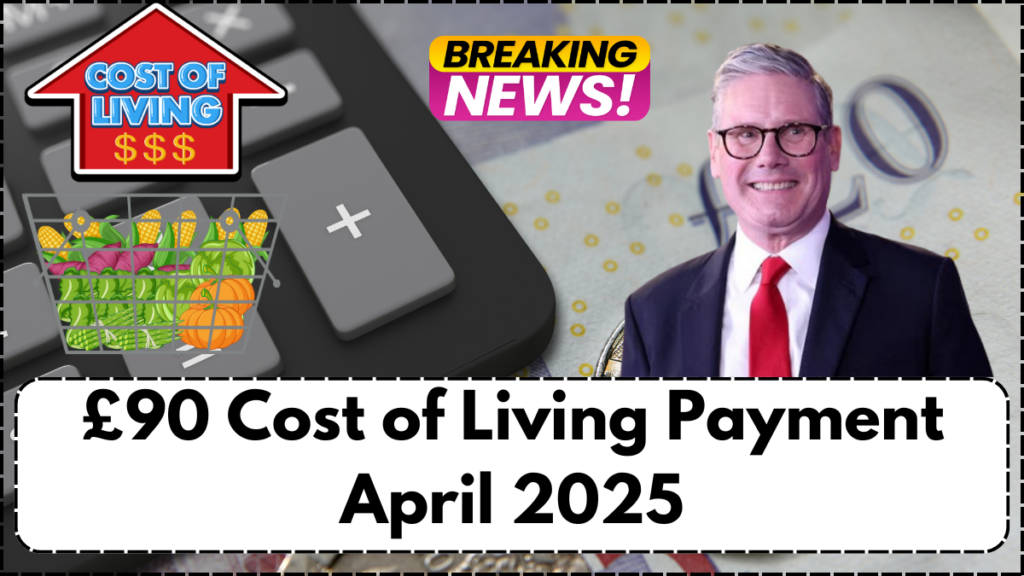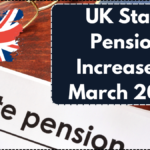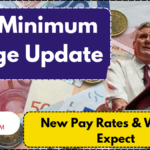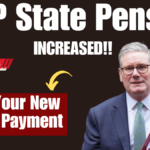In April 2025, the UK government is issuing a one-time £90 Cost of Living Payment to help low-income households cope with ongoing financial challenges. This payment is part of the extended Household Support Fund and is aimed at easing the impact of high inflation, particularly for those reliant on income-based benefits. Unlike some previous aid schemes, this support will be deposited automatically for eligible recipients, simplifying the process and ensuring timely access to funds.

Key Payment Details
| Feature | Details |
|---|---|
| Payment Amount | £90 |
| Eligibility | Universal Credit, Income-Based JSA, Income-Related ESA, Income Support, Pension Credit |
| Payment Method | Automatic bank transfer |
| Payment Timeline | Between mid-April and April 30, 2025 |
| Administered By | Department for Work and Pensions (DWP) |
| Additional Local Support | Vouchers, bill aid, food support via councils |
| Action Required by Claimants | Ensure bank and personal details are current with the DWP |
What Is the £90 Cost of Living Payment?
The £90 Cost of Living Payment is a targeted financial relief initiative rolled out by the UK government in response to sustained inflation and the rising cost of basic necessities. With food, energy, and transport expenses continuing to climb in 2025, this one-off, tax-free payment offers immediate assistance to those most vulnerable to economic strain.
Unlike more complex aid programs, this support is delivered automatically to individuals already receiving qualifying benefits. This ensures rapid disbursement and eliminates the need for separate applications, reducing administrative delays and barriers.
Why Is This Payment Being Issued Now?
As of April 2025, the cost of living in the UK remains a pressing issue. Households are seeing substantial increases in energy bills and supermarket prices, forcing many to prioritize between heating and eating. The government has responded by allocating resources through the Household Support Fund to assist those in greatest need.
This payment is meant to alleviate immediate pressures, especially for families that depend on state support to make ends meet. It acts as a temporary cushion, allowing recipients to address essential costs without further financial compromise.
Eligibility Criteria Explained
You may qualify for the £90 Cost of Living Payment if you were receiving one or more of the following income-based benefits during the eligibility window defined by the DWP:
- Universal Credit
- Income-Based Jobseeker’s Allowance (JSA)
- Income-Related Employment and Support Allowance (ESA)
- Income Support
- Pension Credit
Individuals receiving only non-means-tested benefits—such as Carer’s Allowance or contribution-based ESA—will not be eligible unless they also receive one of the listed income-related supports.
How to Make Sure You Receive the Payment
No application is required, but accuracy in your benefit account information is crucial. Here’s how to avoid missing out:
- Verify that your bank account details are current and correct.
- Update your contact details if you’ve moved or changed phone numbers.
- Monitor your Universal Credit journal for updates, if applicable.
When Will You Receive the Payment?
The Department for Work and Pensions will issue payments between mid-April and April 30, 2025. These will arrive in the same bank account where your regular benefits are deposited.
If you haven’t received your payment by April 30, follow this checklist:
- Wait 10 working days after April 30.
- Review your bank account and recent benefit statements.
- Check your Universal Credit journal for messages.
- Contact the DWP helpline if the payment is still missing.
Additional Help from Local Councils
In addition to the £90 payment, local authorities have been granted funds through the Household Support Fund. Each council has the autonomy to decide how this money is distributed, which may include:
- Grocery vouchers for families in urgent need
- Prepaid energy meter top-ups
- Repairs or replacement of essential appliances
- Food aid during school holidays
Residents are encouraged to contact their local council directly or visit their website to learn what specific support is available in their area.
Making the Most of Your £90 Payment
While £90 might not cover every expense, it can provide meaningful support if managed wisely. Here are ways to stretch its value:
- Clear small overdue utility bills or top-up pre-paid meters
- Purchase staple food items in bulk
- Save it for emergency expenses like travel or minor household repairs
- Use it for essential child-related costs, such as school meals or supplies
Planning your spending can maximize the impact of this one-off grant and offer a bit more breathing room in your monthly budget.
The Bigger Picture: Household Support Fund in 2025
The £90 Cost of Living Payment is just one part of the broader Household Support Fund strategy. This government initiative supports:
- Families facing food insecurity
- Households with high energy costs
- Individuals needing help with essential household appliances
- Children who require meal assistance during school breaks
As funding distribution varies by region, visit your council’s website or contact their community support services for guidance.
Conclusion
The April 2025 £90 Cost of Living Payment is a timely measure to help households dealing with persistent financial strain. For those on qualifying benefits, it offers an easy, automatic way to access short-term support. Combined with local council programs, the payment forms part of a more comprehensive safety net designed to protect the most vulnerable as economic pressures continue. Staying informed, keeping your details up to date, and exploring all available support can help you make the most of this assistance.
FAQs
Who will receive the £90 Cost of Living Payment in April 2025?
Those receiving means-tested benefits such as Universal Credit, Income-Based JSA, Income-Related ESA, Income Support, or Pension Credit during the qualifying period.
Do I need to apply for the payment?
No application is necessary. Payments are made automatically if you meet the eligibility criteria.
What should I do if I don’t receive the payment?
Wait up to 10 working days after April 30, 2025, check your benefit account, and then contact the DWP if it still hasn’t arrived.
Can I receive help if I’m not eligible for the £90 payment?
Yes. Local councils may offer additional support through the Household Support Fund, even if you don’t qualify for the national payment.
Is the £90 payment taxable?
No, it is a tax-free grant and does not count towards your taxable income.
For More Information Click Here
Pari is a passionate writer known for captivating stories that blend imagination and reality. Inspired by travel, history, and everyday moments, Pari crafts narratives that resonate deeply with readers.




